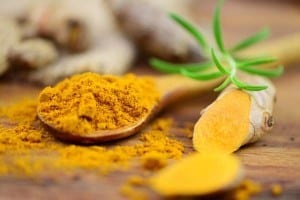Menstrual cycles or periods put forth a number of health challenges for women.
For some, the symptoms are unnoticeable while for some it is very difficult to get past that phase every month.
Pre menstrual syndrome is the initial phase where women face a number of symptoms prior to the start of their menstrual cycle: mood swings, back pain, irritability, bloating, flu-like symptoms, etc.
Even during menses heavy bleeding, irregular cycles, malaise and body ache, gastric symptoms make it quite tiresome for some women.
Menses are a part of women’s health but that does not mean it does not require medical attention. The goal of the current treatment is to reduce the symptoms faced during menses.
Non-steroidal anti-inflammatory drugs are given to help with the pain, hormonal pills to help regulate menses and normalize bleeding and also medications that help with gastric symptoms are administered.
Turmeric is a spice used in Indian and Asian cuisine.
It has an orange-yellow color which is attributed to the presence of curcuminoids. Curcuminoids are antioxidants present in turmeric.
Curcumin, the principal curcuminoid, has a number of pharmacological properties that could be of help during menses.
Table of Contents
- How could turmeric benefit in menstruation?
- 1. Turmeric combats pre menstrual syndrome
- 2. It can reduce pain and malaise
- 3. Turmeric is a phytoestrogen and emmenagogue
- 4. Turmeric acts as the anti-spasmodic agent
- 5. It can reduce mood swings and depression associated with menstruation
- 6. Turmeric can help with causative factors behind irregular or abnormal menstruation
- 7. Turmeric can reduce bloating and other gastric symptoms
- 8. It can protect against infections and toxic conditions
- Dosage
- Precautions
- Conclusion
How could turmeric benefit in menstruation?
Here a few ways by which turmeric acts and could help in relieving or reducing symptoms that occur during menses.
1. Turmeric combats pre menstrual syndrome
A premenstrual syndrome is a number of physical and emotional symptoms occurring prior to menses. Emotionally women can feel irritable, experience mood swings and depression; some also have uncontrolled rage.
Physically the symptoms could include headache, flu-like symptoms, bloating, muscle ache, back ache, etc.
A clinical trial was conducted wherein individuals suffering from a premenstrual syndrome where some received curcumin while some received placebo.
Two capsules were given twice a day for seven days before menstruation and three days after the cycle. This treatment was conducted for 3 consecutive cycles.
Curcumin by virtue of its anti-inflammatory property helped with the pain occurring in PMS and also modulated brain chemicals and thus alleviated mood changes and depression.
Reduction in the score for severity of PMS in curcumin group was by 59 points and in placebo group was around 14 points.
Researchers concluded that curcumin can significantly reduce the severity of PMS.
What does this mean?
Curcumin helps in reducing severity of premenstrual syndrome by regulating brain chemicals- neurotransmitters and reducing inflammation. Thereby it attenuates pain and mood changes occurring in PMS.
2. It can reduce pain and malaise

- Inhibits activity of inflammatory enzymes like COX and LOX
- Reduces production of prostaglandins, hormones that play an important role in pain and inflammation
- Inhibits the migration of immune cells which promote inflammation
This helps in reducing pain since these enzymes are also involved in pain sensation.
Also by virtue of its antioxidant property, curcumin prevents the formation of reactive oxygen species which also play an important role in pain perception. (Read Turmeric for Pain)
Animal studies show that curcumin acts as a natural painkiller and also works in combination of painkiller, diclofenac.
The analgesic or painkiller activity of Meriva, a specialized formulation of curcumin, is found to be comparable to that of anti-inflammatory drugs like acetaminophen and nimesulide.
Another benefit of turmeric’s analgesic activity is that it does not cause gastric side effects like regular painkillers.
What does this mean?
Turmeric’s natural painkilling activity can help in the malaise, muscle ache and generalized body ache associated with menstruation. It has an added benefit over the non steroidal anti-inflammatory drugs- turmeric does not cause gastric erosion or any other side effect.
3. Turmeric is a phytoestrogen and emmenagogue

This suggests its use in female healthcare.
Curcumin is a mild phytoestrogen- a plant source of estrogen.
As per the traditional medicinal system, turmeric is considered as an emmenagogue. It can stimulate uterine bleeding.
There has been no study to prove this, but if this would be proven then turmeric could serve as a natural aid in regularizing menses.
Traditionally turmeric has been used to treat amenorrhea-absence of menstrual cycles.
Having said this, I have to mention that there are a few anecdotal pieces of evidence that suggest that taking turmeric can even reduce a heavy flow during menses.
More research is required to understand the phytoestrogenic activity as well as the emmenagogue nature of turmeric.
What does this mean?
Turmeric possesses estrogenic activity and traditional medicine suggests that it can stimulate uterine bleeding. This could be of help in regularizing menstrual cycle and normalizing flow.Despite of turmeric’s property of stimulating uterine bleeding, some have experienced a reduction in heavy flow on taking turmeric.
Due to its uterine stimulating properties, it is advised to avoid turmeric in pregnancy. However Asian women continue to use turmeric in diet even during pregnancy.
4. Turmeric acts as the anti-spasmodic agent
Menstrual cramps or abdominal ache is the most common symptom presented during or prior to menses.
Turmeric and curcumin as anti-inflammatory agents combat pain by reducing the production and inhibiting the activity of inflammatory agents which also play a major role in pain perception.
An animal study was conducted to understand the anti-spasmodic effect of turmeric. Contractions in the uterus and intestine were induced by external agents.
High doses of curcuminoids were found to inhibit contractions and relax the smooth muscles of intestine and uterus.
It can be inferred that curcuminoids administration can help in spasmodic pain occurring in the stomach and uterus.
What does this mean?
Curcuminoids’ anti-spasmodic activity can reduce the severity of menstrual cramps.
5. It can reduce mood swings and depression associated with menstruation

A couple of recent studies suggest that curcumin has anti-depressant activities and can help in reducing symptoms of the major depressive disorder.
Animal studies show that curcumin modulates brain chemicals and improves antioxidant defences to curb anxiety-like symptoms.
Curcumin also reverses the undesirable effects caused by stress and improves cognition.
This ability of curcumin to influence brain chemicals can be of use in managing mood swings, sleep disturbances and depressive-like symptoms associated with menstruation. (Read Turmeric for Depression)
Brain-derived neurotrophic factor (BDNF) is a protein that is involved in learning and memory.
A study reported that when women suffering from PMS were treated with curcumin, their BDNF levels were high and the PMS related mood symptoms were low.
What does this mean?
PMS is characterised with severe mood related changes and depression like symptoms. Curcumin can attenuate mood swings, depression and anxiety related symptoms occurring in PMS.
6. Turmeric can help with causative factors behind irregular or abnormal menstruation
A few health conditions can be responsible for the heavy or irregular bleeding during menses and turmeric can help to treat these root causes:
Endometriosis
It is a disorder in which uterine lining grows outside the uterus and this can cause painful periods. Curcumin helps in endometriosis by:
- Reducing estrogen levels and suppressing the growth of the uterine lining
- Reducing production of inflammatory chemicals
- Destroys immune cells to prevent the progression of endometriosis
- Cuts down blood supply to undesirable endometrial growth
For more details on this read Turmeric for Endometriosis.
Uterine fibroids
Uterine fibroids are non-cancerous growth in the uterine lining and can cause prolonged menstrual cycles. Curcumin is proven to inhibit the proliferation and growth of uterine fibroid cells.
Malik et al suggest that curcumin as a nutritional supplement can be focussed on as a new therapy for uterine fibroids. (Read Turmeric for Uterine Fibroid)
PCOS
A polycystic ovarian syndrome is a condition characterized by cysts in the ovary and irregular or absence of menses.
No direct study has been conducted to evaluate the effect of turmeric on PCOS, but as the anti-inflammatory agent, antioxidant and as phytoestrogen turmeric could help with secondary symptoms of PCOS. (Read Turmeric for PCOS)
What does this mean?
Turmeric can help in conditions like endometriosis, uterine fibroids and PCOS which tend to cause irregular or heavy menses.
7. Turmeric can reduce bloating and other gastric symptoms
Prior to menses or even during menstruation, women experience bloating, belching, acidity, etc.
Additionally taking non-steroidal anti-inflammatory drugs to reduce the pain and malaise further exacerbates stomach acidity.
Review studies suggest that curcumin has sufficient therapeutic potential when it comes to a digestive disorder.
Few of the pharmacological properties of curcumin that help in reducing symptoms of indigestion and other gastric symptoms include:
- Anti-inflammatory
- Antioxidant
- Anti-microbial
A clinical trial demonstrated that administering turmeric extracts to individuals suffering from indigestion and flatulence improved their health within 7 days. Around 87% of the individuals receiving the treatment showed a positive response.
Curcumin also inhibits the development of ulcer formation as a result of hyperacidity and reduces gastric inflammation by inhibiting H.pylori infection (a bacterium that contributes to excessive stomach acid).
What does this mean?
Due to its gastroprotective action, curcumin can help alleviate gastric symptoms like bloating, belching occurring during or prior to menstrual cycles.
8. It can protect against infections and toxic conditions
Menstruation increases your risk to develop infection.
Turmeric is a broad spectrum anti-microbial agent.
Women tend to develop Candida infection prior to menses or even after it. Curcumin is a proven anti-Candida and anti-fungal agent.
Menstrual toxic shock syndrome is an infectious serious condition occurring as a result of prolonged use of tampons. Animal study shows that turmeric can inhibit growth of bacteria that cause menstrual toxic shock syndrome.
What does this mean?
Turmeric as an anti-microbial agent can serve as a protective measure against Candida infection, menstrual toxic shock syndrome and other infections.
Dosage
Turmeric in diet is absolutely safe. About ½ to 1 teaspoon of turmeric powder with a dash of black pepper and/or healthy fats (coconut oil or olive oil) should do the trick.
One of the best ways to take turmeric is The Golden Paste. You can directly consume it or add it to your salads, smoothies, rice preparations, soups etc. 1-2 teaspoons of Golden Paste 2-3 times a day is therapeutic.
Another delicious way to take turmeric is Turmeric Milk. You can find some good recipes with turmeric here.
If you need help identifying good supplements or organic turmeric powder, check this resource.
Precautions
Turmeric supplements should be taken with caution since they contain high concentrations of curcumin. A few conditions in which turmeric supplements should be avoided are:
- Pregnancy and lactation
- Prior to surgery
- If suffering from gallbladder issues
- If taking medications for diabetes, blood thinning meds or certain antidepressants
Traditionally turmeric is used to treat amenorrhea (absence of periods) and hence it is thought that it can stimulate menses. If this is the case then it should be avoided in case you suffer from heavy flow; but some individuals suffering from heavy bleeding actually benefit from turmeric.
It is best to avoid turmeric supplements during menses; turmeric in diet is safe. Consult a health practitioner before starting on turmeric supplements.
Conclusion
Menstrual cycles, though a part of each woman’s life, can present with some symptoms that are difficult to endure. Treatment directed towards ameliorating the symptoms such as NSAIDs, antidepressants, hormonal pills can pose side effects.
Turmeric works as a natural aid in reducing menstruation related symptoms- be it mood swings or unbearable pain or irregular or abnormal bleeding. Also it does not cause side effects.
Making turmeric a part of your life can provide long term relief not only in case of menses but any other health related aspect of your life.


Hi, I have heavy and painful periods with huge blood clots. Does drinking tumeric helps? And what is the best time to take tumeric drink? And should I stop drinking it when during periods? Thanks!
Hi. You can consume turmeric tea.
https://www.turmericforhealth.com/turmeric-benefits/brew-a-cup-of-turmeric-tea
You can also consider taking Golden Paste. Start with small doses such as 1/4-1/2 tsp and if you see no side effects then increase the dose gradually to 1 tsp 2-3 times a day over a few weeks. Best taken with food to avoid acid reflux. Avoid taking it at the same time when you take meds.
http://www.turmericforhealth.com/turmeric-recipes/how-to-make-turmeric-paste-or-golden-paste
http://www.turmericforhealth.com/turmeric-recipes/how-to-make-golden-paste-from-raw-fresh-turmeric
While there is no data that indicates that one should avoid turmeric during menstruation, some individuals do report increased flow while taking turmeric during periods. So you may stop drinking turmeric tea during the periods.
Hi I’ve been having irregular menstrual cycle for almost 2yrs now… Will turmeric solve it for me? Thank you.
Hi. Turmeric is found to be useful in disorders related to menstrual health as it relieves inflammation, pain and many readers have reported that it regularizes menstrual cycle. It depends what factors are causing irregular cycles. If it is stress or PCOS, turmeric is likely to help.
Please consult your health practitioner about the same.
I am 64 and think turmeric supplements caused menstrual-like bleeding…ultrasound on uterus showed old calcified like fibroid and a vascularized one. Kidney ultr. Was fine
Hi, I have been drinking turmeric (1tbs+black pepper+flax seed oil+water) for several years, but a few months ago I had my hormone coil removed and my periods have, since then, been much closer and heavier than I remember them being from prior coil. On the other hand I have absolutely no stomach aches or anything. Could it be a good idea to pause or limit the turmeric intake during the actual period? I’m 45. Thanks!
Hi,
I have started drinking turmeric about 2 months ago, because I liked the ‘golden lattes’. Since then, Last few weeks, I have had periods with only a week of non bleeding in between (3 times in a row now). I am also taking contraception, which I was advised to stop taking now. I haven’t stopped drinking turmeric yet, just came across this article. Could it be the cause? Is it safe taking it when I am on the pill? Thanks
Hi. Dietary turmeric should not cause any interactions with oral contraceptives. In case you are using supplements please keep a gap of 3-4 hours between consuming the two. Traditional medicine suggests that turmeric can cause menstrual bleeding especially in case of amenorrhoea. It is highly unlikely that turmeric in diet should cause excessive uterine bleeding. You can discontinue turmeric and see if the condition improves. Also it is advisable to consult a doctor about this.
i m taking glucophage for pcos i have irregular period now i start tumeric supplement can its help to regular my period n when will come period after taking supplement means how long i use supplement for my period come
Turmeric is found to help regularize menstrual cycle in PCOS, as reported by readers. However we can’t predict it’s action; the effect would differ with every individual. We would suggest consulting a health practitioner about this.
As an Indian women, Turneric powder had been in my diet daily, But I started to experiment with time Turmeric root. I blend a piece of turmeric root with flax oil, black pepper, lemon juice and a little water and drink it daily. I also chop trmueic root and put them in some foods I cook. I have noticed that my menstural pain goes away with in 10 mins or so after consuming turmuric drink. My upper back pain has also reduced significantly.
That is great!Thank you sharing this.
Hi, I have been diagnosed with uterine fibroids and ovarian cyst thus making my menses irregular and painful. Since I started taking the tumeric tea, period is normal but very heavy. Usually suffer from swollen feet which doctor say is due to circulation, since on the tumeric, the swelling is actually getting less, some days no swelling at all.
Hi. Glad to know that turmeric helps you. As you mentioned that menstrual bleeding is heavy but normal since you started drinking turmeric tea, try cutting down on the amount of turmeric used to make the tea or cut down on the consumption to see if it helps.
Also consult a health practitioner for other treatment options for your health condition which might be necesssary.
Please tel me how to consume it ??is it enough that a teaspoon of turmeric powder is added to hot water???
Hi, i’ve been drinking tumeric tea for about a month and this time around my period is abnormally long. Its been 2 weeks and still going. I am not sure this is because of the tumeric teA.
I have my periode for one month now, sometimes heavy, sometimes not, but with only a few days without bleeding. Since 40 days I am taking a curcuma supplement. Now on this website I found the answer to my extremely long period and I will stop taking the curcuma! Last week i even went to a gynecologist who could not find any anormailities and who thought that the reason was to be found in increased stress. She wanted to prescribe me a birthcontrol pill in order to regulate my hormone system and stop te bleeding. I think it is a pity that it is not written on the leaflet of the curcuma supplement that I am taking, that it might stimulate the bleeding. So Nadi, I hope you also found the reason of your long period! Succes, Els from Belgium
Hi. In that case please discontinue the use of turmeric tea or limit the amount of turmeric consumed.
hi its been 3 months since ive never get in to my monthly period..this time i am afraid,and im started drinking turmeric for about almost 3 weeks. i dont know how does it take a long time to wait. and i dont know what to do. do i need to continue doing this treatment?
Hi. Many readers have reported that turmeric benefits in regulating menstruation. Dietary turmeric as turmeric tea should help but we can’t predict as to how long you should continue the treatment. Turmeric is a spice and can be taken for life. You can consult a herbalist or naturopath about this.
What are the causes of absent periods for this lady?
I’m trying to verify amounts. 1) For pain and inflammation during menstrual cycles, drinking a cup of preferred tasting tumeric milk recipe a day with 1 tsp of tumeric in it, as long as it has 1 tsp or 1 Tbs of coconut oil or olive oil or ghee in it will help? Please correct the amount of oil and also if f ghee is not advised as a healthy fat. 2) Is it ok to drink a cup during the cycle? You stated not to take supplements during the cycle. This would just be ground tumeric powder in a milk recipe by one of your recommended sellers. 3) If needed during the cycle, can a 2nd cup with another 1 tsp of tumeric be taken? My daughters and I get terrible cramps, body aches and inflammation during our cycles. We’ve been taking ibuprofen for years, but it has begun to not work consistently and I also have just had concerns of newly publicized side effects.
Hi. Yes ghee is a healthy fat and 1 tsp of oil should be sufficient. 1 cup of turmeric milk is absolutely fine during menstrual cycle. But we would suggest 1/2 a tsp of turmeric powder; this actually depends on your body because some people face no issues with turmeric and menstrual bleeding and some do experience increase in bleeding.
Women in India continue consuming dietary turmeric even during cycles.
And yes you can consume a second cup as well for pain relief but limit to 1/2 tsp in second cup. Start with 1/2 tsp for each cup initially for a first days of the cycle and then increase to 1 tsp.
Hi can I ask If Turmeric is really Helpful for Regulating menstruation/ Irregular Period? I’ve been drinking Turmeric With Milk almost a week but my menstruation is not coming yet..
Hi. Dietary turmeric is good for regularizing menstrual cycles and would be working towards improving your health. But we can’t comment on when you would see the effect. You may consider using turmeric supplements but if you have missed more than 2 cycles it is best to consult a doctor about this.